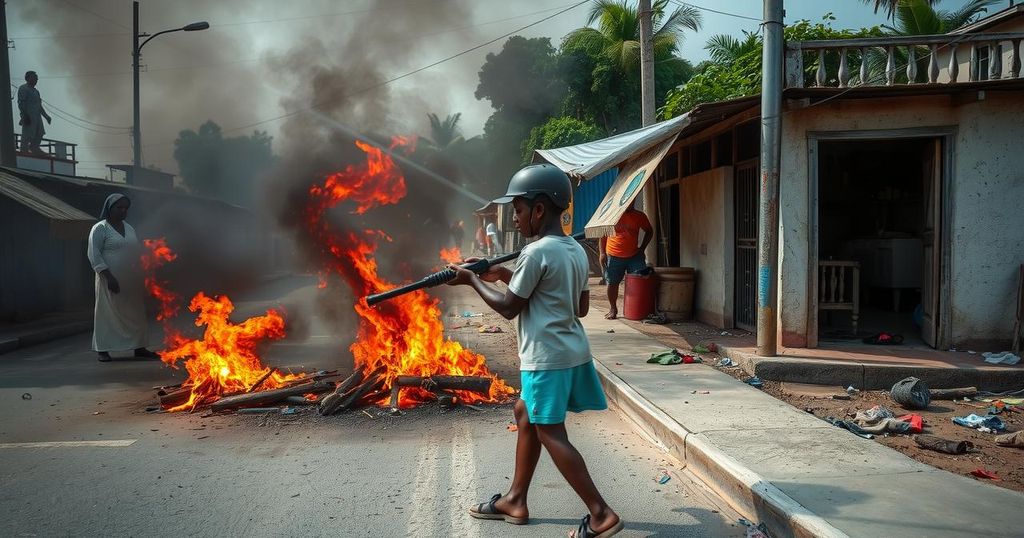Political Unrest in Mozambique Claims Lives Amid Election Disputes

At least 21 people have died in Mozambique amid political protests following disputed election results, where opposition leader Vanancio Mondlane alleges electoral fraud. The unrest began after the Constitutional Council affirmed the ruling Frelimo Party’s victory, leading to violent confrontations with police and arrests. International observers raise concerns about election transparency and urge collaborative efforts for peace.
As political unrest continues in Mozambique, at least 21 fatalities have been reported since the onset of protests earlier this week. These disturbances erupted following the Mozambique Constitutional Council’s affirmation of the outcomes from the contentious elections that took place on October 9, 2023. Opposition leader Vanancio Mondlane, who opposed the ruling Frelimo Party’s dominance, publicly condemned the election results as fraudulent and has pledged to assume the presidency on January 15, despite losing the election. His declarations have incited further unrest, resulting in violent clashes with police, leading to over 70 arrests and escalating tensions throughout the nation.
The electoral results confirmed that the Frelimo Party candidate, Daniel Chapo, received approximately 65.2% of the vote compared to Mondlane’s 24%. Mondlane has continuously challenged these figures, raising accusations of election rigging and a lack of transparency during the electoral process. Protests have been prevalent following the announcement, with Mondlane’s supporters voicing their dissatisfaction and demanding accountability in the electoral processes. He has since retreated to an undisclosed location but utilized social media to communicate with supporters, urging them to reject violence despite the turmoil.
It is essential to contextualize the political climate in Mozambique, where the Frelimo Party has maintained authority for 49 years. The systemic issues within the political landscape have spurred allegations of irregularities during the recent elections, with various civil society groups and international observers highlighting concerns regarding transparency and fairness. U.S. officials have expressed sympathy towards Mondlane and voiced the necessity for all parties involved to engage collaboratively to restore stability and uphold justice.
Matthew Miller, spokesperson for the U.S. Department of State, stated, “Civil society organizations, political parties, the media, and international observers, including those from the United States, cited significant irregularities in the tabulation process, as well as concern about the lack of transparency throughout the election period.”
In conclusion, the political landscape in Mozambique is marked by significant unrest following disputed election results, leading to loss of life and calls for accountability. Opposition leader Mondlane’s assertions of electoral fraud and intended claim to the presidency have heightened tensions in a country struggling with political stability. Observers worldwide urge for engagement in dialogue to ensure a return to peace and respect for democratic processes.
The recent political unrest in Mozambique stems from contentious election results where opposition parties have raised serious concerns about the integrity of the electoral process. The ruling Frelimo Party, which has maintained political dominance since independence, declared victory amid allegations of vote-rigging by opposition leader Vanancio Mondlane. This ongoing unrest highlights broader systemic challenges within Mozambique’s political framework, illustrating the challenges of governance and democratic accountability in the region.
The ongoing crisis in Mozambique underscores the struggle for political representation and the need for electoral integrity. With Vanancio Mondlane challenging the results of the October elections and vowing to assume the presidency despite officially losing, the nation faces a critical juncture. The situation remains tense, and international stakeholders emphasize the importance of peaceful dialogue and accountability to prevent further violence and uphold the democratic process.
Original Source: www.upi.com







